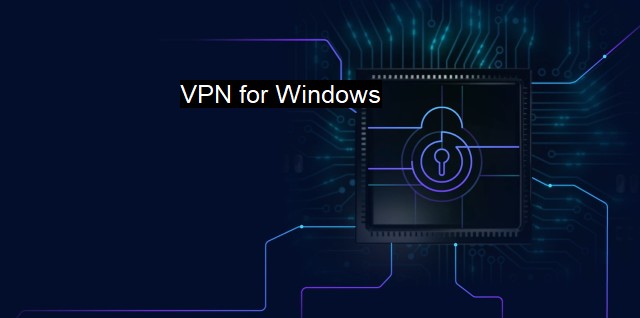What are VPN for Windows?
Strengthening your Cybersecurity: The Benefits of a Virtual Private Network (VPN) for Windows
In the field of cyber security and anti-virus, the term "VPN" is often used to refer to a technology—and the associated software—that safeguards online privacy and preserves individual freedom on the internet. VPN stands for Virtual Private Network and it is a vital tool for maintaining online security, particularly for Windows operating systems, given their enormous global user base.VPN for Windows is a kind of software created specifically to bolster online security, protect user privacy, and ensure anonymity while browsing the internet on a Windows device. It functions by setting up a secure, encrypted connection between a user's computer, server, or another device and a remote server typically located in a different part of the world. Critically, all the data sent through this encrypted connection is unreadable to any entity who attempts to snoop or monitor the transmission.
The purpose of a VPN for Windows is not merely to ensure data encryption; it's also used for IP masking. When someone uses a VPN, their original IP address is substituted for another from the VPN provider, usually drawn at random from a list of servers situated around the globe. This means the actual location, identity, and online activities of Windows users are concealed, making their online behavior anonymous.
A VPN is a must-have cybersecurity tool, particularly for Windows users because the Windows operating system is widely used; hence it is a common target for hackers and cybercriminals. This heightened potential for attacks necessitates the use of a VPN which serves as an extra layer of defense against these potential intrusions.
Truthfully, today's cybercrime trends tell a terrifying tale of sophisticated malicious software (malware), ransomware, phishing attacks, and a slew of other internet-based threats designed to exploit vulnerabilities and execute unauthorized access to sensitive data. Windows devices may be infected with malware or other viruses that send sensitive information to cybercriminals when users browse infected websites or download malicious software. A VPN, especially in conjunction with a good antivirus software, can help protect your Windows device from these threats by preventing unauthorized access to your private information and safeguarding your browsing activities.
VPNs also offer benefits such as bypassing geographic restrictions for streaming services, avoiding tracking from advertisers, and accessing blocked websites in regions with internet censorship.
In terms of configuration, VPNs for Windows typically come as an installable software package that runs in the background, silently securing and anonymizing all internet traffic. Most VPN software integrates seamlessly with the Windows operating system, allowing users to activate and deactivate their secure connection with a single click.
It is essential to acknowledge that while a VPN dramatically enhances online privacy and security, it doesn't give an absolute shield against all forms of cyber threats. Users still need to follow best practices in terms of password hygiene, ensuring software is updated promptly to patch any security vulnerabilities, and being vigilant about phishing scams and other social engineering attacks.
To wrap up, a VPN for Windows provides crucial cybersecurity protection by obscuring the user's IP address and encrypting their data to make it completely anonymous and unreadable. Albeit not invincible, it is indeed an effective weapon against unwanted intrusions, government surveillance, and the preying eyes of hackers. When coupled with a competent antivirus solution, it provides comprehensive protection for Windows users in an ever-turbulent cyberspace.

VPN for Windows FAQs
What is VPN for Windows and how does it work for cybersecurity?
VPN for Windows is a virtual private network that encrypts all of your internet traffic and tunnels it through an intermediary server. This protects your online activity from surveillance and hacking attempts, improves privacy, and reduces the risk of cyberattacks. VPN for Windows also provides an additional layer of security by masking your IP address and making it difficult for anyone to track your online behavior.Is there any antivirus protection included in VPN for Windows?
VPN for Windows does not have antivirus protection built-in. However, some VPN providers may offer additional security features like malware protection, DNS leak prevention, and ad-blocking. It's important to research and compare different VPN providers to find one that meets your specific cybersecurity needs.How do I choose the best VPN for Windows?
When choosing a VPN for Windows, consider factors such as speed, server locations, security features, and cost. Look for providers with a high number of servers in different countries, strong encryption protocols, and a no-logging policy. You should also check if the VPN provider offers apps for your other devices and if it's compatible with your Windows version.Do I need to pay for VPN for Windows?
While many VPNs for Windows offer a free version, they often come with limitations such as a lower data limit, fewer server options, and slower speeds. Paid VPNs typically offer more advanced features and better performance. However, it's important to choose a reputable VPN provider that is transparent about its pricing and doesn't have any hidden fees.| | A | | | B | | | C | | | D | | | E | | | F | | | G | | | H | | | I | | | J | | | K | | | L | | | M | |
| | N | | | O | | | P | | | Q | | | R | | | S | | | T | | | U | | | V | | | W | | | X | | | Y | | | Z | |
| | 1 | | | 2 | | | 3 | | | 4 | | | 7 | | | 8 | | |||||||